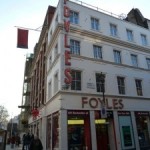I think library leaders and staff would be interested in reading this article about Foyle’s, a London book retailer and their call for public input into their new flagship store. Replace “bookstore” with “library” (and booksellers with librarians) thoughout the article and you will be reminded of the changes we’ve no doubt heard about in the more forward-thinking libraries, as well as the questions that get pondered everyday in the library blogosphere.
Just look at the opening quote: “You want to be advised by a real person — you want to go to a place where they understand books and where the recommendation is real.”
And the article:
What makes a good bookshop [library]? Should second-hand be in the mix too? Is a café important? How do you incorporate digital? Foyles’ clarion call at the Bookseller’s FutureBook conference in London last week seeks to answer some of these questions.
Foyles on Charing Cross Road in London
The retailer has joined forces with theBookseller to invite customers [patrons] and industry experts [library leaders] to help design its new flagship on Charing Cross Road, which it will move into in early 2014. With discoverability of increasing importance, the timing couldn’t be more apposite. Everyone is agreed that bricks and mortar bookshops [libraries] are under threat, but what elements are needed to make a physical bookstore [library] survive in an increasingly digital world?
The parallels are obvious to anyone who works in a library. The similarities suggest that bookstores, often thought of as competitors to libraries, are suffering equally in the new digital world, and if they don’t quickly adapt, they might evolve out of existence. The article suggests that bookstores need to be community meeting places where books get recommended by real people, where they can learn about the newest e-readers, the newest digital offerings, and the apps that make them good book delivery devices, and where people can meet each other, enjoy café offerings and art, and in general be simultaneously stimulated and coddled.
As a side note, I just had a lengthy conversation at a party about books and reading with an architect (who came of age during approximately the same decade), during which I realized that the last person he would think of consulting about his next read would be a librarian (!). I wanted to get more into that subject; however, readers advisory is not my best suit, at the moment, because I tend to recommend books I’ve read, and those might not be to everyone’s taste. But the best recommenders understand (or expertly explore) the tastes of their clients/patrons, and use readers advisory tools that deliver their next best read. I did explain to him that I use tools to recommend. The first obvious book recommender that is easy and free for everyone to use is Goodreads, but you have to put a bit of effort into it. They have a book recommender engine similar to Netflix. The more books you rate, the better the recommendations. Librarything is another obvious one. However, these are personal ones, and work only for you! Less well known is that your local library will probably have a literature/book database that provides you with readalikes if you specify the criteria (authors, styles, themes, content, stories that are similar to something you recently read and liked). My library uses Books & Authors (Gale Cengage Learning). And lastly, find a librarian who understands your tastes and can help you to your next read.
But back to the Publishing Perspectives article on the new flagship bookstore in London.
Author RogerTagholm has interviewed delegates from the Futurebook conference who have observed bookshops around the world as well as the strategies of electronics retailers. Who knows, you may see some of these realized in the future. But will you see them at your local library?
For example:
Charlie Redmayne, CEO of Pottermore, believes — surprisingly — that a lesson can be learned from UK electronics retailer, Dixons. “Look at how they’ve thrived by improving their customer service — I think if you get that right, you can charge a premium. You need a store that stands up for selection, that finds the best books of real quality. You want to be advised by a real person. You want to go to a place where they understand books and where the recommendation is real, not the online version which is likely to be a self-published Amazon author.
Libraries experience a constant tension between acquiring valued literature and popular stuff. As mentioned above, it is useful to go into an establishment and know that everything was already vetted for you. Librarians typically acquire only the most highly rated books, at least as their base. If budget allows, then patron tastes do somewhat control what other purchases are made. But you can depend on finding all the Newbury award winners, the National Book Awards, the NY Times 10 best, etc. Libraries of course benefit from having real people on staff who are trained to help you, who love books, and who have more experience with technology than the typical user. But I don’t want to wear out the parallels here, between bookshops and libraries, only emphasize that if this kind of brainstorming went on in the library planning world, we’d see some amazing flagship libraries! Which libraries can you think of that have already incorporated some of these future trends?
Note: It’s great to see a slideshow of splendid libraries featured on HuffingtonPost today! It would be interesting to explore what these libraries feature besides the terrific spaces.

